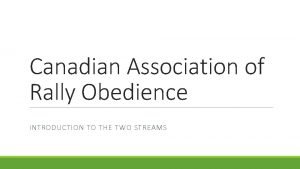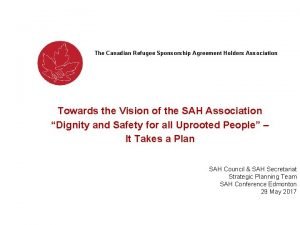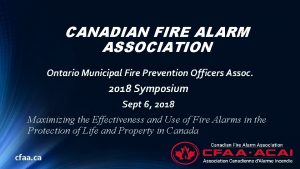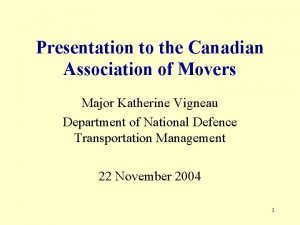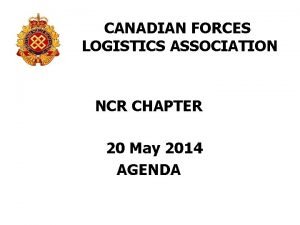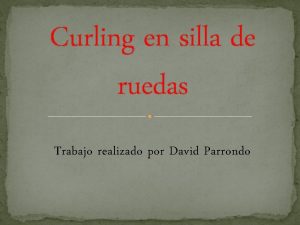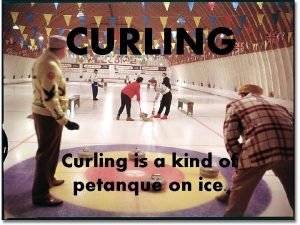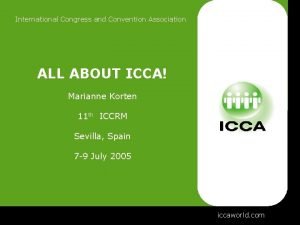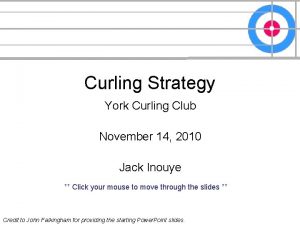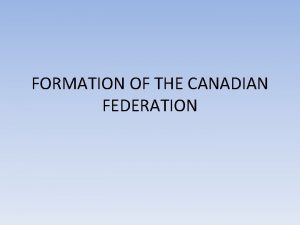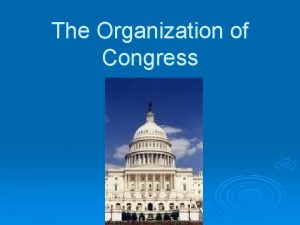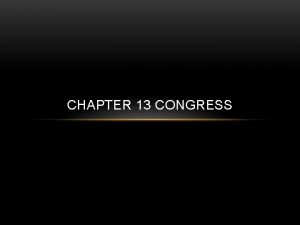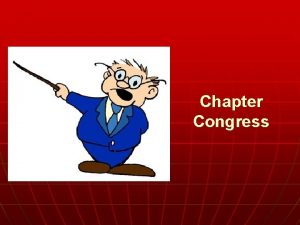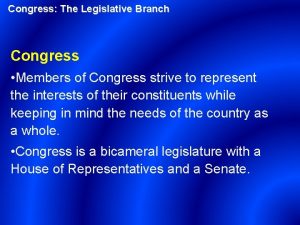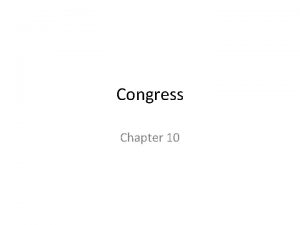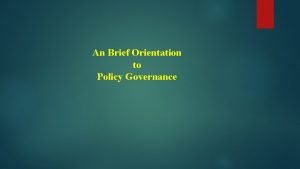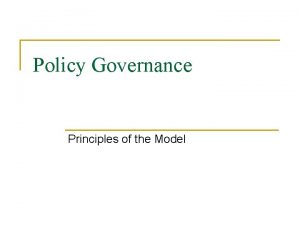Policy Governance Canadian Curling Association National Curling Congress


















- Slides: 18

Policy Governance Canadian Curling Association National Curling Congress Thursday June 16 th, 2011 8: 45 am – 9: 30 am

The Board has three Job Responsibilities 1. Linking the organization with its owners. 2. Developing four types of policies that reflect the organization’s values. 3. Ensuring that the CEO complies with Board Policies and achieves the Board’s defined Ends.

5 Subject Areas 1. MA Code of Conduct – Violations 2. 3. 4. 5. MA Communication MA Liaise Role Owners vs Customers Values Discussion

Subject #1 – MA Code Of Conduct - Violations - Are there areas missing? - Does it cover all scenarios? - Do all MA’s have their own codes? Governance Member: Georgie Scribe: Greg

Subject #2 – Communication With Owners - Should we include all members in our responses to governance inquiries? - What should the parameters be for the MA President’s call? - Would the owner group like to have the first ½ hour prior to every MA President’s call to discuss MA items without the CCA? Governance Member: Hugh Scribe: Jim

Subject #3 – MA Liaise Role - What do you expect from your liaise? Should your liaise be from your area? Should the liaise attend your meetings? What are the pros/cons of having the same liaise year after year? Governance Member: Marilyn Scribe: Ron

Subject #4 – Owners vs Customers - Define the differences are between acting as an owner vs a customer? - How can we assist the MAs to be self managing and bring forward owner issues? - How do we reduce regional preferences and do what is best for curling in Canada? Governor: Elaine Scribe: Mitch

Subject #5 – Values Discussion - Are there values you’d add or delete? - Does your MA’s have values defined? Governor: Jack Scribe: Bernie

Next 45 Minutes Split the room into 5 groups. Each group will remain at their table but the governor and scribe will move tables after 7 minutes When you hear the bell that signals the subject changes Please find your Group.

Governance Feedback • Group discussion time

Background • Rest of the slides are background materials for each group

Subject #1 – MA Code – 2010 AGM • • • • 7. 2 Member Association Code of Conduct Tom Birchall (NSCA) reported that following discussion on the MA Code of Conduct during the NCC Business Session, it was felt that some of the sections in the document could be further clarified an appeal process should be added. Vice Chair Jack Bowman advised that the intent was not to detract from MAs’ individual Codes of Conduct or burden the MAs with two levels of discipline. Tom suggested, therefore, that the MA Code of Conduct distributed at the NCC be modified and a CCA appeal process added to serve as the next level to the MAs individual codes of conduct. Tom went on to state that by proceeding in this manner, it would compel each MA to have an appropriate, enforceable, code of conduct in place and exercise due diligence and care in processing any breaches under their own codes. By establishing an appeal process to the CCA, the rights of the individual and MAs would be protected. It was agreed that the MA Code of Conduct should be referred back to the Governance Committee for review and resubmission to the 2011 NCC. When doing so, the Governance Committee is asked to consider the following input from the 2010 AGM delegates: 1. Where possible, alleged violations of the Code of Conduct shall be processed at the Member Association Level. 2. If the situation/circumstance prevents this from happening or an appeal is brought forward, the suggested CCA document shall be used. 3. If a further appeal is brought forward, an independent third party, with expertise, shall be contacted for a final ruling. MOTION TO WAIVE NOTICE: Moved by Tom Birchall (NSCA), seconded by Lori Mc. Fadden (OCA) that a waiver of notice be granted to bring forward a motion concerning the Member Association Code of Conduct. GRANTED MOTION: AGM 2010. 05 Moved by Tom Birchall (NSCA), seconded by Lori Mc. Fadden (OCA), that the Member Association Code of Conduct be approved as submitted by the CCA, reviewed by the assembly and amended herein. CARRIED

Subject #1 – MA Code of Conduct • • Member Association Code of Conduct This policy is a guide for the Member Associations of the Canadian Curling Association and sets expectations regarding their conduct as organizations and the conduct of their Board Members and staff as individuals in dealings with the CCA, other Member Associations and organizations and individuals associated with the CCA and its members and affiliates. Member Association Boards and staff shall be expected to conduct themselves respectfully, professionally and in the mutual best interest of the Canadian Curling Association and its members, and specifically shall: Act in the collective interests of the Canadian Curling Association and its Member Associations, while actively promoting their respective positions, perspectives and desires. At all times, act with decorum and be respectful of other Member Association Boards and staff, CCA Board and staff, volunteers, stakeholders and affiliates. Respect the confidentiality of CCA discussion and materials. Member Association Boards and staff shall not disclose confidential information obtained through membership within the CCA to any persons not entitled or required to know. Ensure activities which are unethical, or that have the potential to negatively impact the CCA or curling’s public image, are neither engaged in nor condoned. Acknowledge and appreciate that all CCA Governors and Member Association Boards are volunteers, and as such, time is at a premium. To that end, Member Association Boards and staff shall: – – – • • Respect each other’s contribution to the discussion and encourage each other to present their views. Allow an opportunity to speak in the discussion of any topic, listen respectfully and refrain from side conversations. Strive to manage time effectively and agree to come prepared in advance for meetings Share observations or concerns in a manner which includes the CCA Board and all Member Associations. Member Association Boards and staff accept the responsibility to create an environment where concerns can be expressed without fear of condemnation or retribution. Accept that the decision-making process may involve conflict, believing that it is only when all points of view are revealed that the best decision can be made. Member Association Boards and staff shall respect and support decisions taken after a fair opportunity for expression of views in accordance with Board Governance Policy BG-9: Linkages with Owners has occurred and so long as decisions taken are within the terms of CCA By-laws and Board Governance Policies.

Subject #1 – MA Code of Conduct - Violations 8. When an alleged violation of the MA Code of Conduct occurs the following process will be used: a. The Member Association where the alleged violator resides shall be notified and their code of conduct shall be in affect for all first offences. b. Upon an appeal or if the MA has no Code of Conduct or when additional alleged offences occur the following shall be in place: i. The Member Associations shall annually appoint three (3) Association Presidents to sit on the MA Code of Conduct Review Committee. • Unless one of the alleged violations involved one of the 3 appointed Member Association Presidents, whereby the Member Associations would choose a replacement. ii. The CCA Vice- Chair of the CCA Board will also sit on this committee and act as the facilitator. iii. The CCA Vice-Chair shall: • • Receive complaints of the alleged violation either verbally or in writing Acknowledge receipt of the compliant Contact the alleged violator to present their view of the alleged violation Convene the MA Code of Conduct Review Committee iv. The MA Code of Conduct Review Committee shall: • • • Be provided with information received to date from the CCA Vice-Chair Be bound by confidentiality of the information. Determine the appropriate course of action based on the evidence collected, the severity of the infraction and the number of occurrences of the said violation. The course of action may include: – – – – A verbal reprimand A written reprimand Recommend to the CCA Board removal of the offending person from a CCA Board Committee Removal of the offending person from the Chair/Member Association Presidents’ conference calls Removal of voting rights at the NCC for the offending person Require that the offending person issue a letter of apology or public statement Prepare any follow-up documentation and ensure action is taken. c. In the event an alleged breach involves all Member Associations, the CCA Vice-Chair of the board shall refer the matter to an independent third party such as CCES or the Sport Dispute Resolution Centre of Canada for review whose recommendation shall be final and binding upon the CCA Board and Member Associations.

Subject #4 – Owners vs Customers • Member Associations act as owners some times. • Member Associations more frequently act as customers. • The role played by the member and the appropriate organizational contact is determined by: – Primary Interest • Individual Interests (Means) • Collective Interests (Ends) – Time Perspective • Immediate needs (Means) • Future/Visionary (Ends)

Owners when issue is: Board of Governors -In the interest of ALL MAs -Long term -Proactive -Related to values/ends CEO MAs are both: Customers when issue is: CCA Operations -In the interest of individual MAs -Shorter term -Reactive -Related to means Customers or Beneficiaries

Subject #5 – Operational Values • Family We are a community of individuals that acts like a family that is connected and passionate about the sport of curling. • Excellence We are committed to do our very best at all times and achieve high standards. • Commitment The alignment of both personal and corporate goals to enable a commitment to succeed so that the organization will be successful for all. • Integrity We act in a fair, consistent and forthright manner which enables honorable delivery of our programs and services. • Respect We show respect by collaborating, communicating and cooperating with all of our partners and stakeholders. • Transparency We act in an open manner.

The Board does not exist to manage the organization, it exists to govern: 1. To determine the purpose to be served. 2. The Ends to be pursued. • What Results? • What Worth? • What Priority? 3. The values to be exercised
 Canadian association of rally obedience
Canadian association of rally obedience Canadian refugee sponsorship agreement holders association
Canadian refugee sponsorship agreement holders association Canadian hard of hearing association bc
Canadian hard of hearing association bc Canadian fire alarm association
Canadian fire alarm association Canadian association of movers
Canadian association of movers Ncr chapter one
Ncr chapter one Canadian association for community living
Canadian association for community living Ciip canada
Ciip canada Curling en silla de ruedas
Curling en silla de ruedas Curling point system
Curling point system Petanque curling
Petanque curling Youtu.beu
Youtu.beu The narrator says she got out her curling irons
The narrator says she got out her curling irons Magyar curling
Magyar curling International congress and convention association
International congress and convention association What is greece's national animal
What is greece's national animal National children's science congress projects ideas
National children's science congress projects ideas Objective of zoo
Objective of zoo National child policy 1974
National child policy 1974
